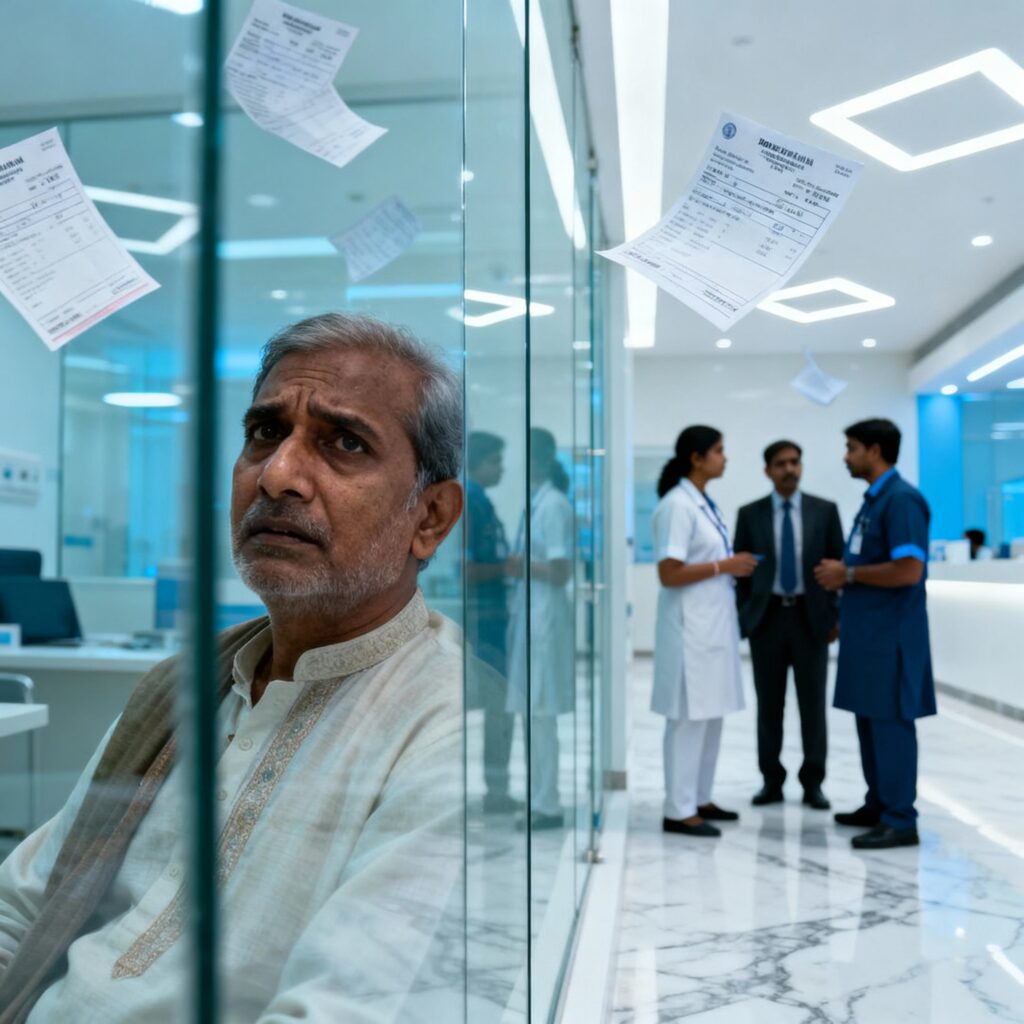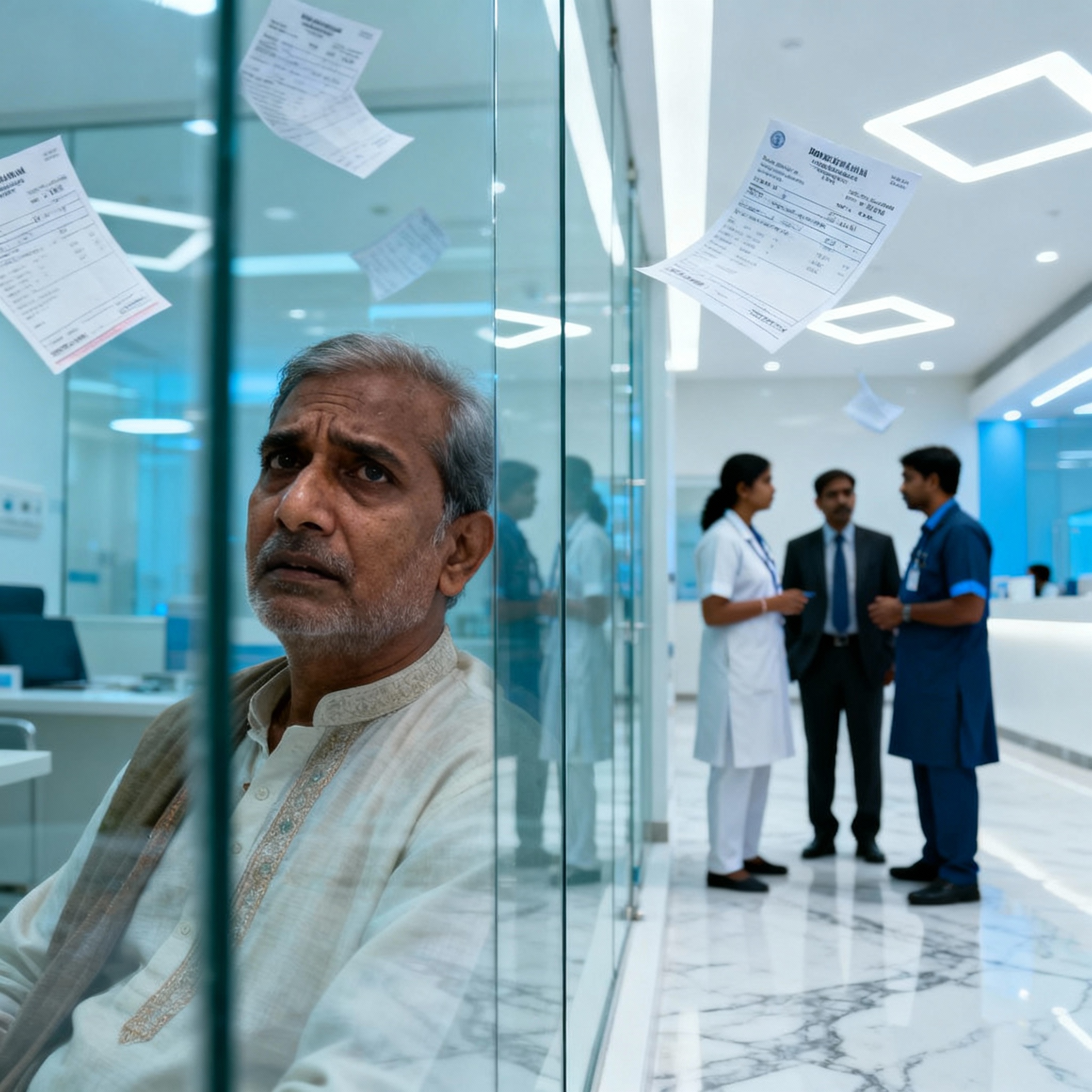By Dr. Fiaz Maqbool Fazili
Healthcare is one of the most fundamental human needs, a cornerstone of dignity and survival. In India, however, the question is no longer whether treatment is available, but whether it is accessible, affordable, and safe. The rise of private healthcare has undoubtedly transformed the country’s medical landscape—gleaming hospitals, sophisticated technology, and specialist doctors. Yet beneath the polished surface lies a paradox. While private hospitals offer a promise of efficiency and choice, they often prioritize profit over patient well-being, raising deep concerns about ethics, safety, and equity.
The Context
India’s public health system, despite its vast reach, is plagued by chronic underfunding, overcrowding, and infrastructure gaps. Government hospitals—whether in metropolitan cities or district headquarters—struggle with shortages of beds, medicines, and staff. Safety standards are inconsistently applied, infection control is lax, and the patient-doctor ratio is dangerously skewed.
For the poor, these hospitals are often the only option, but long queues, neglected facilities, and the absence of accountability make healthcare delivery inefficient and unsafe. For the middle class, such conditions push them toward the private sector, where at least the promise of comfort, speed, and modernity appears more tangible.
But this shift has not come without consequences. What we have created is a two-tiered system: a fragile, overstretched public health service on one side and a profit-driven private healthcare industry on the other.
The Private Boom
Over the past three decades, private hospitals have mushroomed across the country. Some are modest nursing homes, others sprawling corporate chains with branches in every major city. The sector has absorbed billions in investment and now accounts for nearly 70% of healthcare delivery in India.
Private hospitals have played a vital role in bringing advanced technology—robotic surgeries, world-class ICUs, and cutting-edge diagnostics. They attract top specialists, many trained abroad, and have positioned India as a global hub for medical tourism. For affluent Indians and foreign patients, private hospitals are the only place where the promise of “international standards” is delivered.
Yet this impressive façade conceals uncomfortable truths. Profitability, not patient care, has become the primary driver. Healthcare, instead of being seen as a public good, is often treated as a commodity—purchased, marketed, and traded.
The Business of Illness
It is no secret that private hospitals in India operate like corporations. Their survival depends not just on patient inflow but on revenue targets, profit margins, and shareholder expectations. In such a setting, ethical boundaries blur.
Stories abound of unnecessary procedures—stents inserted where lifestyle management would suffice, cesarean deliveries preferred over natural births, or prolonged ICU admissions for terminal patients with little chance of recovery. Inflated billing, opaque pricing, and hidden charges have become routine.
Doctors, once guided by the Hippocratic oath, often find themselves under pressure to “deliver revenue.” Young specialists working in corporate hospitals quietly admit to being evaluated not just for clinical competence but for how much money they generate.
Even diagnostic centers and pharmacies attached to hospitals are accused of prescribing excessive and costly tests, driven less by medical necessity and more by profit incentive. For many families, a single hospitalization can wipe out years of savings, pushing them into debt traps.
When Profit Trumps Safety
The pursuit of profit does not merely inflate bills; it also undermines safety. Several investigative reports have highlighted how patient safety protocols are sometimes compromised to reduce costs. Staffing ratios are diluted, cheaper substitutes for medicines are prescribed, and equipment maintenance is postponed.
There have been cases where expired or substandard implants were used, medical waste was mishandled, and ICUs were overcrowded beyond safe capacity. Such practices are not merely unethical—they are dangerous, and they turn hospitals from healing spaces into high-risk zones.
The tragedy is that patients enter private hospitals with trust—believing that the price they pay ensures better care. But in reality, the higher cost does not always translate to higher quality. The absence of robust regulation and patient rights charters means that malpractice often goes unchecked.
The Missing Regulator
India lacks a strong regulatory framework to monitor private healthcare. While the Clinical Establishments Act (2010) was designed to ensure minimum standards, its implementation remains patchy and uneven across states.
Unlike in aviation or banking, where independent regulators ensure compliance, healthcare oversight is fragmented and weak. Accreditation bodies such as NABH or JCI exist, but they are voluntary and cover only a small fraction of hospitals. This vacuum enables private institutions to function with minimal accountability, setting their own rules for pricing and quality.
What results is a disturbing situation: hospitals can overcharge, deny treatment, or compromise safety without facing proportionate consequences. Patients and families, often overwhelmed in times of medical crisis, rarely have the time or knowledge to challenge such practices.

Can We Afford Quality Care?
This brings us back to the central question: can we afford quality care in private hospitals? The answer is layered. For the wealthy elite, affordability is not the concern—access and exclusivity are. For the upper middle class, private healthcare remains aspirational but attainable, often at the cost of loans, insurance, or depleting savings. For the vast majority of Indians, however, private healthcare is simply unaffordable.
Even with health insurance penetration rising, the coverage is often inadequate. Policies exclude many treatments, impose ceilings, and leave patients with hefty out-of-pocket expenses. In fact, India has one of the world’s highest levels of out-of-pocket health expenditure, pushing millions below the poverty line each year.
This reality underscores a paradox: private hospitals project themselves as saviors, but they often remain inaccessible to those who need them most.
The Way Forward-
If healthcare in India is to balance quality with equity, we need urgent reforms:
Strengthen Public Healthcare: The foundation must be a strong, well-funded public health system. Government hospitals must be upgraded with modern infrastructure, adequate staffing, and strict safety protocols. Without this, private hospitals will continue to monopolize care.
Transparent Regulation: A strong, independent regulatory authority must be empowered to monitor pricing, ensure safety standards, and enforce ethical practices across private hospitals.
Universal Health Coverage: India must move towards a model where essential healthcare is treated as a right, financed through a mix of taxation and insurance. Countries like the UK and Thailand show that universal healthcare is possible even with resource constraints.
Ethics and Accountability: Medical education must reinforce ethics, empathy, and patient rights. Hospitals must be made accountable for malpractice, with transparent grievance redressal mechanisms.

Public-Private Balance: Private hospitals cannot be discarded—they have the expertise and infrastructure India needs. But they must operate within a framework where patient safety and dignity come before profit.
Private healthcare in India stands at a crossroads. On the one hand, it showcases the best of medical advancement—world-class surgeons, modern technology, and the promise of efficiency. On the other, it risks degenerating into a marketplace where illness is an opportunity for profit and patients are reduced to customers with wallets.
The question is not whether India can afford private healthcare, but whether Indians can afford to ignore the dangerous imbalance between profit and patient safety.
Healthcare cannot be treated as a mere business. It is a moral obligation, a social contract, and a measure of a nation’s humanity. If we fail to regulate and reform, we risk creating a healthcare system where the rich buy survival, the middle class buys debt, and the poor are left to suffer.
India deserves better. Our people deserve hospitals where the oath of healing is stronger than the lure of profit. And our policymakers must realize: in the long run, quality care is not a privilege—it is a right.
The views expressed in this article are solely those of the author and do not necessarily reflect the opinions or views of this newspaper

Leave a Reply